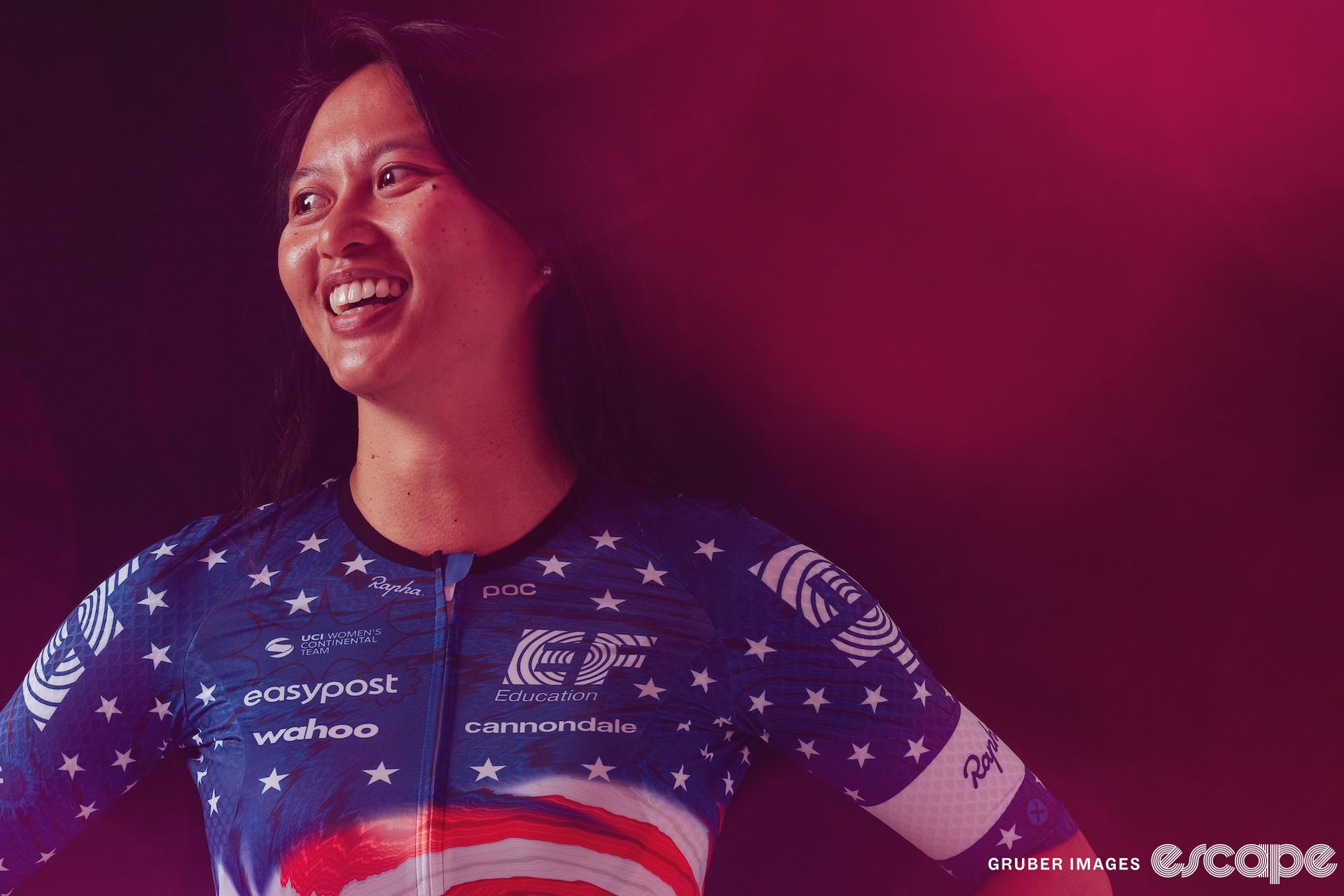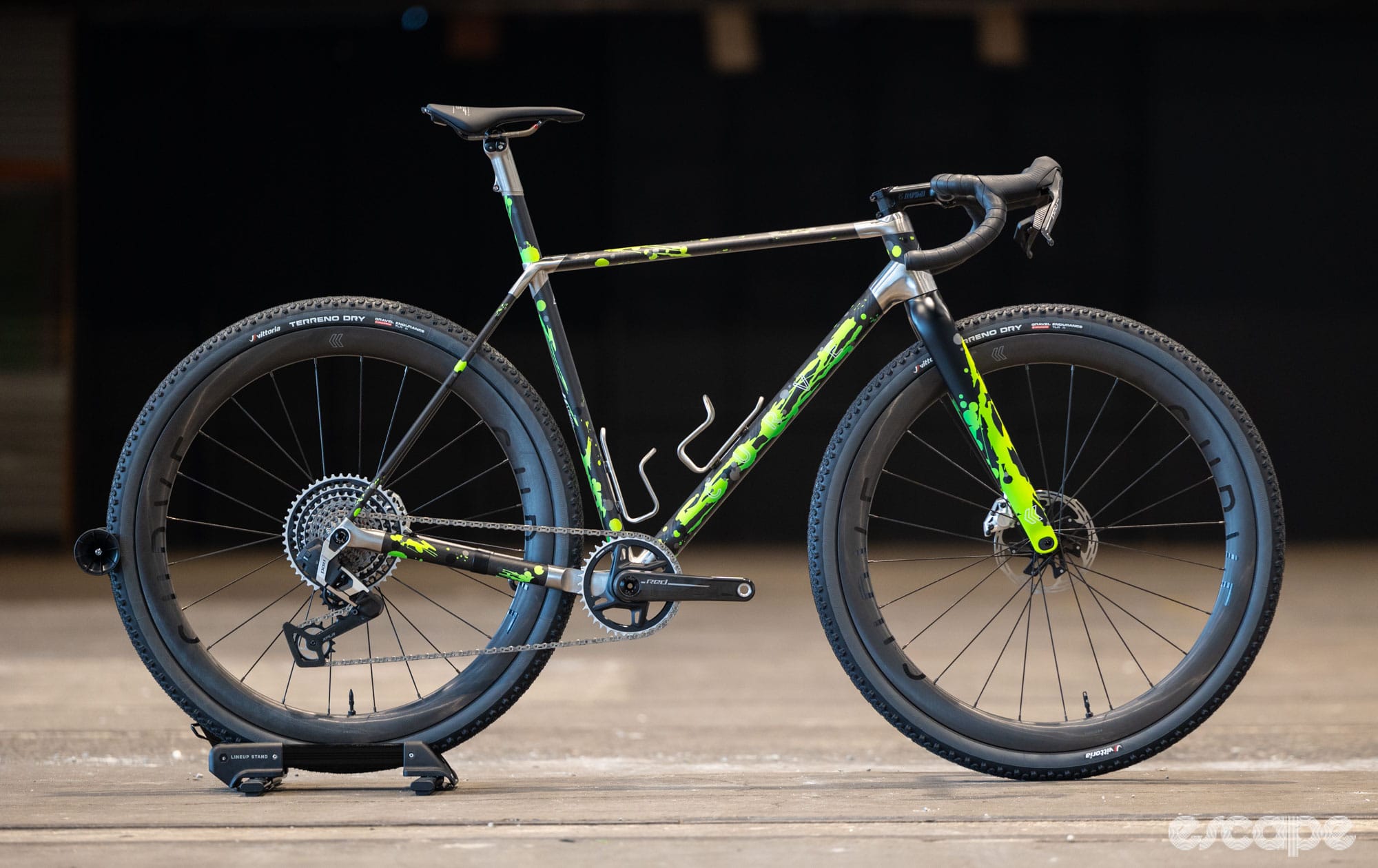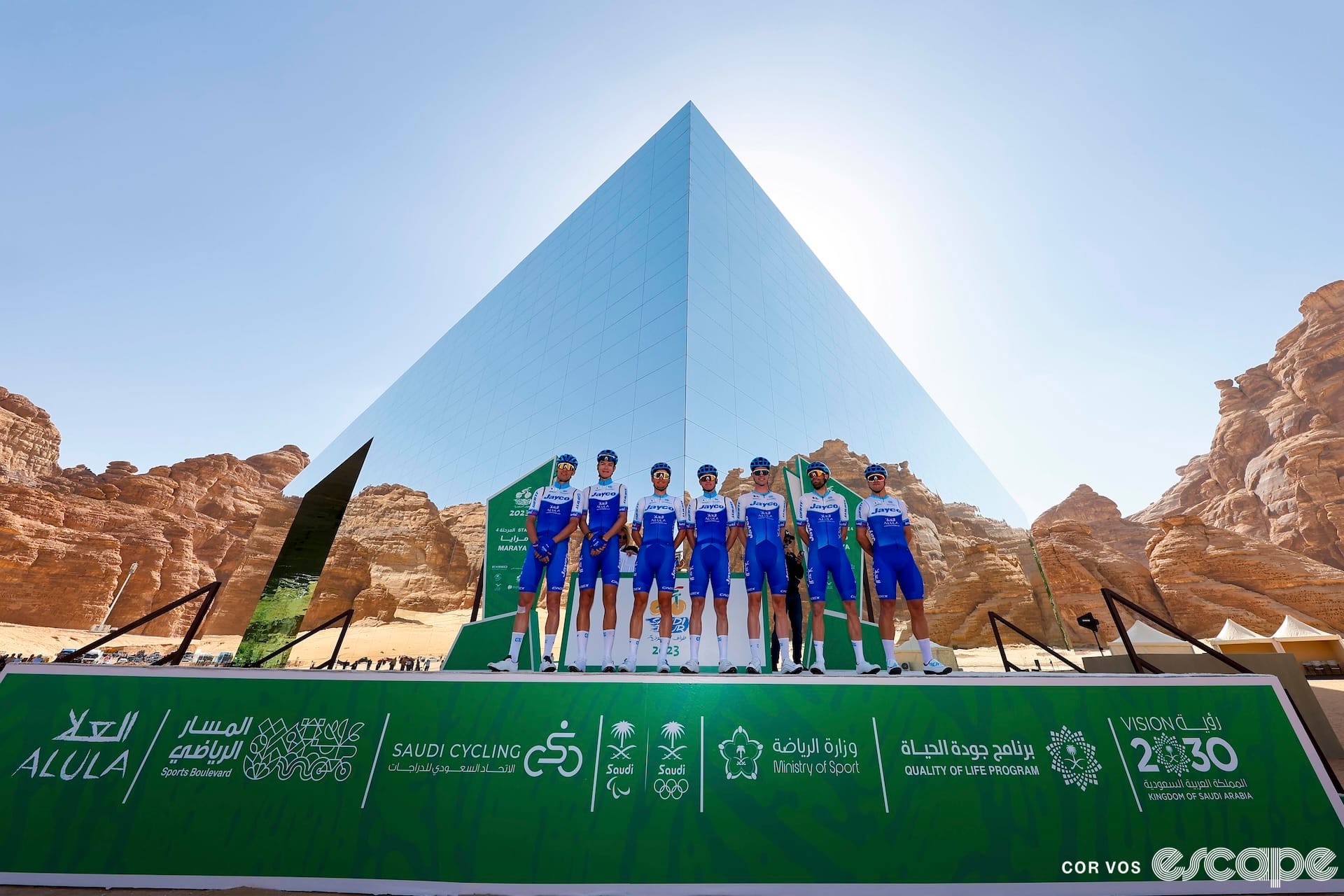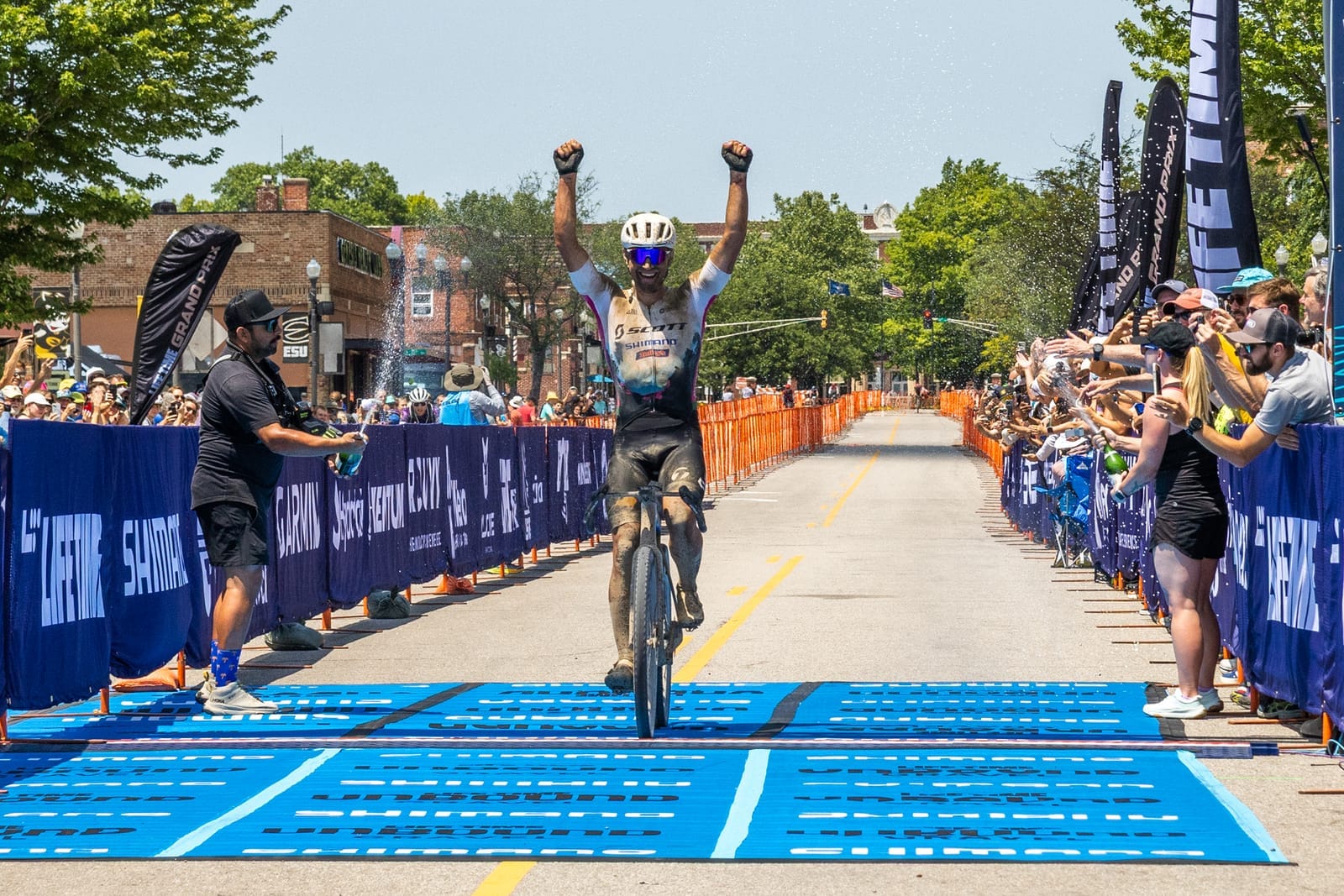Throughout the 15-plus years Coryn Labecki has been in cycling, she's seen three lifetimes of the sport. From a thriving scene in the United States that saw top European teams travel overseas to race to rapid growth in Europe, Labecki has been one of the US riders at the core of women's cycling. She remains the only North American rider to win the Tour of Flanders, but her favourite memories come from time spent with teammates.
At the end of the 2024 season, Labecki hung up her bike. She's thrilled with the decision and being able to focus on her family and life at home in the States.
Escape Collective caught up with Labecki a few months into retirement to see how she felt so far and if she has any plans for the future yet.
Abby Mickey: So how is retirement so far?
Coryn Labecki: It's great. It's definitely a different pace of life and finding a routine at home and kind of learning how to just be in one place for a while, but it's something that I definitely wanted.
I was really tired of living out of my suitcase and traveling back and forth and being away all the time and missing things. I was able to go to a friend's wedding in October, go see family in California, just a lot of things that I think would have been a lot harder to do with training. I'm just able to enjoy those things a lot more.
AM: Do you feel like you're in a honeymoon period of retirement, where you don't really miss riding or the routine?
CL: It is a honeymoon phase, or maybe it was just time to take the next step, or the next chapter, or whatever, and it feels nice.
I don't have to ride every day. I can find activity somewhere else, and it doesn't have to be 3-6 hours anymore. So a little bit more reasonable, and I can get other things done, and I'm not exhausted for the rest of the day. I also don't have to be the priority always, in a sense, I can spend time with Nate and Tank and friends, so it's just nice, and I think a needed balance for me.
AM: Have you picked up any hobbies yet?
CL: Well, a couple years ago, I started with sourdough, and I could really only do it when I was home, when I was in one place for more than a couple weeks. I tried to do it when I was in Europe, but at most I could do pancakes with discard because it was the easiest that I could do.
Bread takes a little bit more time, and I've been getting really into it now that I have more time. I kind of have a home bakery going and just baking stuff all the time. My latest big project was sourdough donuts, which are knock them out of the park kind of recipe. That's been my main thing. And then just spending more time with friends and family.
AM: Are you planning your next move, career-wise yet or are you still waiting to see what happens, what you feel pulls you somewhere?
CL: It's funny. I mean, it's like one of the questions I get often, and I think in general, when you hear retirement, it's just like you're kind of done. So I always respond with like, I don't know. It's nice to be on the other end of that spectrum and have time so I am definitely taking it, giving myself time to just reflect and reset and kind of learn being at home more and what I want to do with my time.
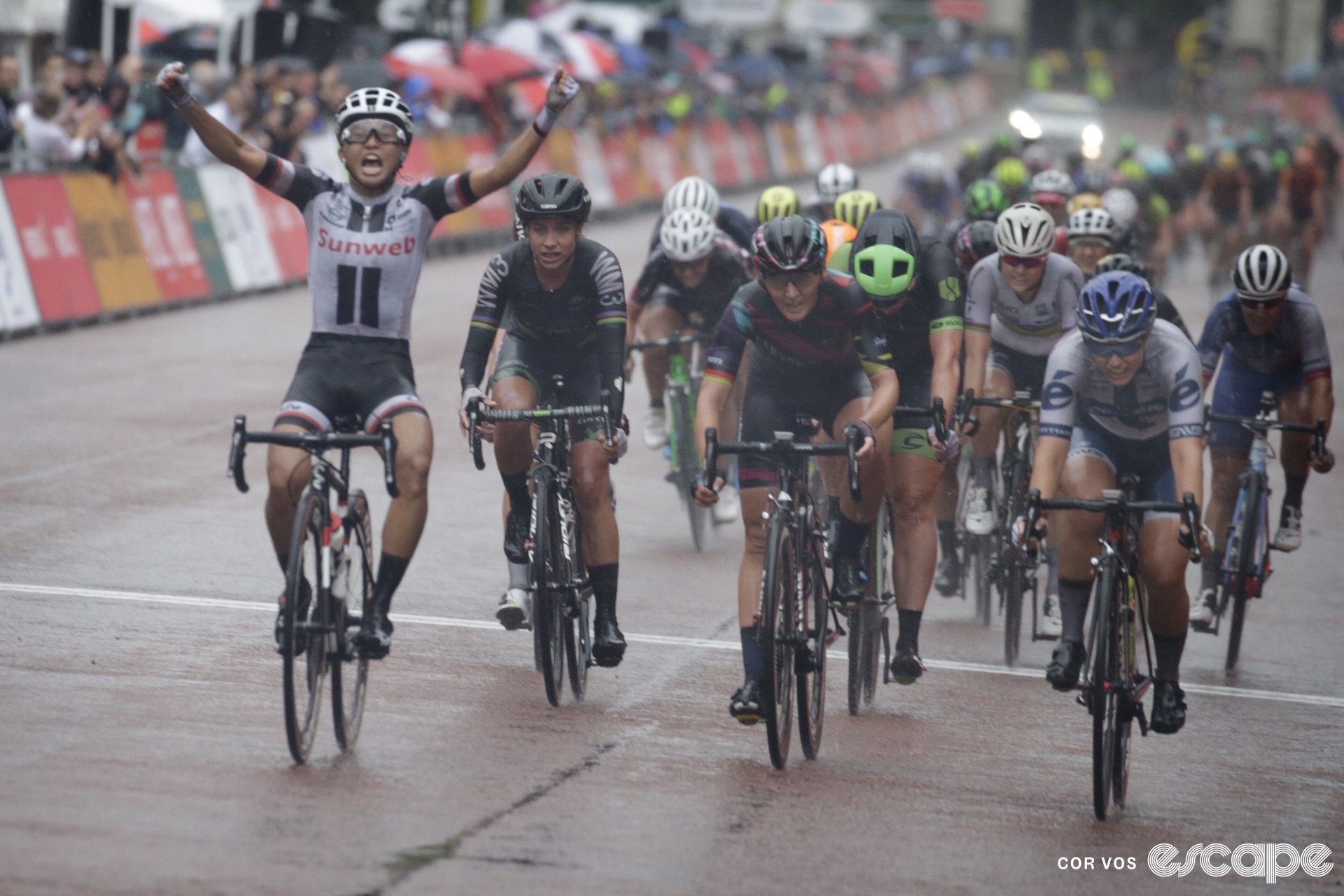
On a more professional scale, I will be coaching with EF so I'll be going down that realm and be able to kind of share what I know from cycling with anyone really, with their coaching team.
AM: You used to always say, when we were teammates, that when you were done racing in Europe you would still do the crit squad.
CL: Well, I think I scratched that itch this year. It's something that I had thought about and played with, and I was like, I'm the national champion, I might as well just race more crits if it fits in the schedule. I think I did everything that I wanted to this year.
AM: The American crit scene is probably taking a big sigh of relief.
CL: That I won't go back to Nationals. Probably very huge.
AM: That's really cool. There's very few people that have the experience level that you do, with how many years you've been in the sport. So that's cool that you'll get to give back a little bit.
CL: Looking forward to it. I never really saw myself in that position, but the more I thought about it, I'm like, I have so much experience that I can share, and I would love to share. So I'm looking forward to going down that route a little bit.
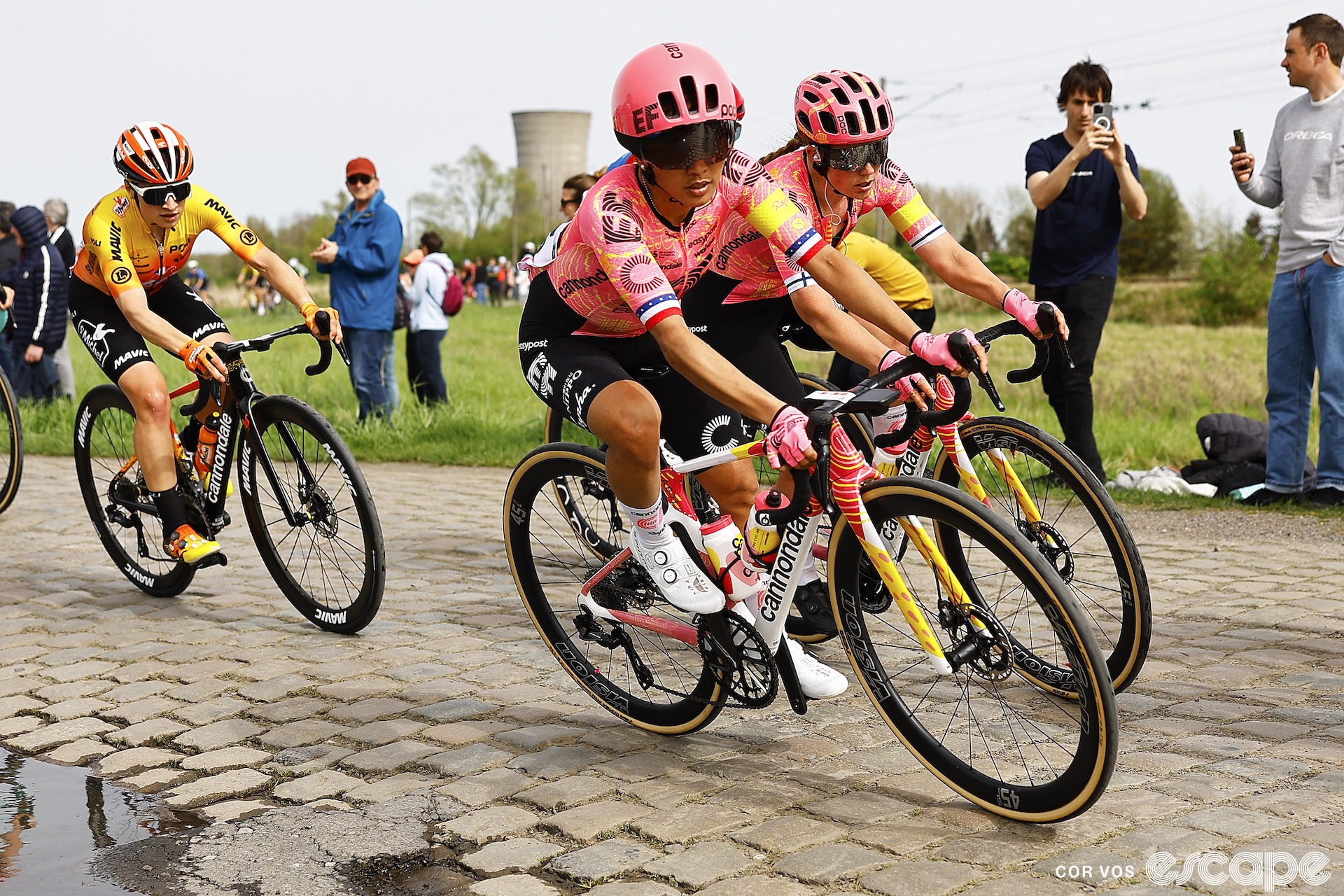
AM: You're retiring as the only North American to ever win Tour of Flanders and I know the last couple of years haven't been super easy, for multiple reasons, but you're walking away with that accolade that has yet to be touched by anybody else, which is a pretty incredible accomplishment.
CL: Yeah, it's pretty awesome, I'm really proud of that one.
I still had wins, you know, from the last two, three years. Maybe just not on the scale that I would have liked, but I think, I definitely put a stamp on the sport before leaving.
AM: It was something amazing to watch, you racing a bike. From when we raced collegiately against each other to being your teammate and watching you navigate a peloton and also navigate being an American trying to race in Europe full time. It's cool that you got to experience that change in women's cycling, and you can hang up your wheels after having experienced the Tour de France Femmes and the big boom in women's cycling.
CL: It's really neat to look back on. I don't know how many generations you can call that. It feels like three [generations] that I've been through within cycling.
When I was a junior and I started getting into professional races, that was races like Redlands Classic and San Dimas Stage Race. That was a time when a team like [HTC-Highroad] would skip some of the Spring Classics to go do some early races in California. Then sometimes they would go to Nature Valley and races like that. I think racing in the US at that time was huge, to see euros coming over. The phase that was during World Cups, before there was WorldTour.
Then there was a phase of going into the WorldTour, which became more organized. Then there was COVID, and a lot of races, especially in the US, went away. You saw that shift where a lot of that top-end [riders] of women's cycling had to go to Europe. That's where the opportunities were, that's where the hardest races were. That's where the money was. I think I kind of kind of followed [that shift].
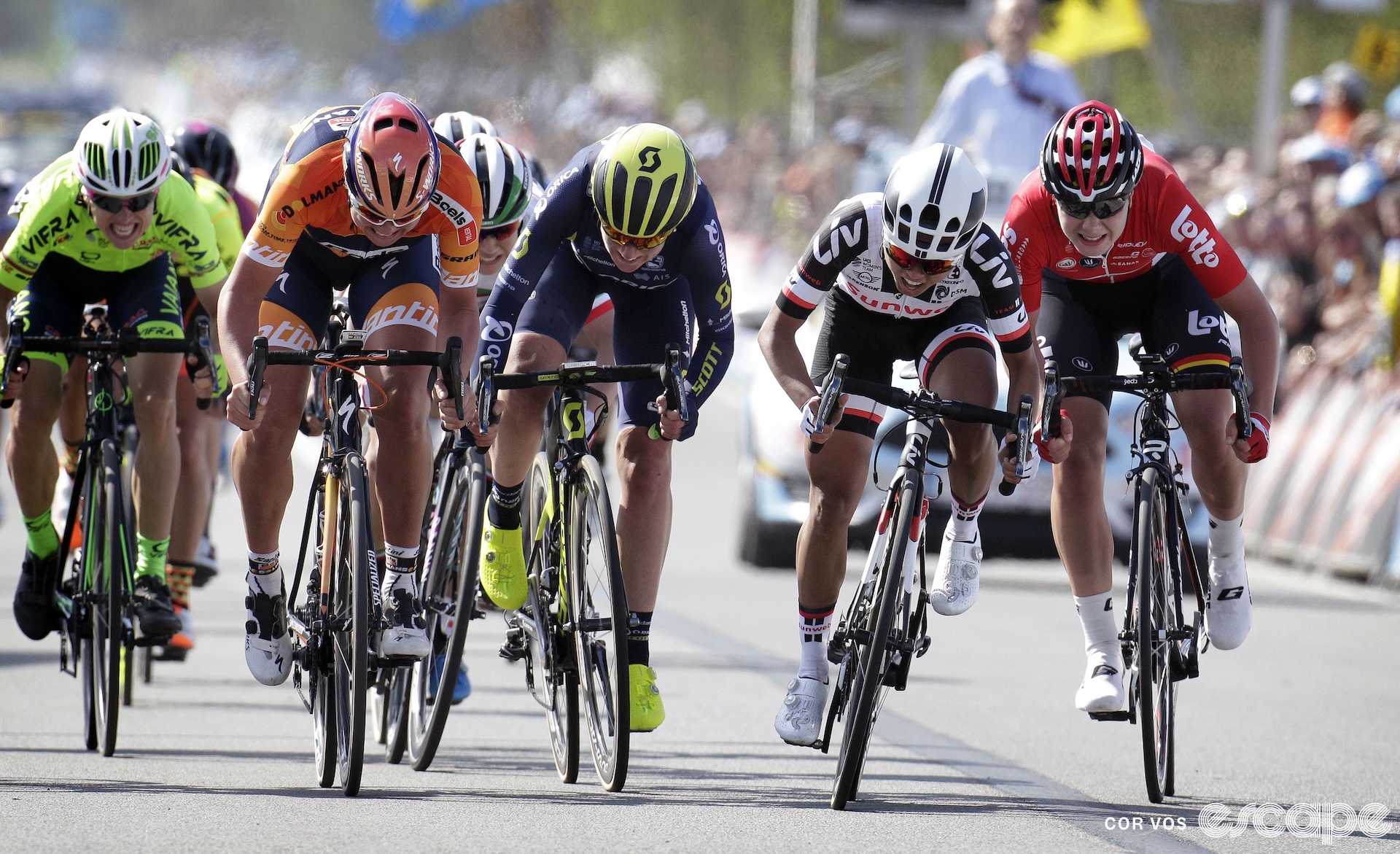
As a junior, I was racing more in the States, doing some trips to Europe, Junior worlds, and things like that. And then eventually I went through college, and then I went to Europe full-time. So I lived through that generation of women's cycling.
Now into this last phase, especially in the last three years since COVID, this huge boom and push. The level is insane. The salaries are insane, the prize money is insane, and it's just amazing. I kind of feel like a little bit of a pioneer, a trailblazer, to be able to go through all these different generations of women's cycling. It's something I'm really proud of. Some people say 'I wish I started cycling now, because the money's so good', but in my perspective, we wouldn't be here if it wasn't for us. It's really something to be commended for.
The last couple of generations to get where we're at, and also make the sport likable and grow it for everyone to understand and see this is something that's really cool that I want to watch, or something that I want to do, or want to be a part of, or follow. You can see that natural progression with the sport.
AM: From your family's perspective of when you were younger, going to those blocks of Europe, they couldn't watch you race. It was following the races sporadically on the internet, if possible. And now everything's live-streamed. We couldn't have imagined that that would be possible four years ago.
CL: A lot of people ask me 'What's the biggest thing that can grow women's cycling?' And for me, my answer is always TV. You put us on TV. You get more people watching it. You get more fans, you get more sponsors. You get a return on investment because all your sponsors are out there on TV. That's the biggest investment we need to make in women's cycling, to continue to grow, because that's when the salaries will come.
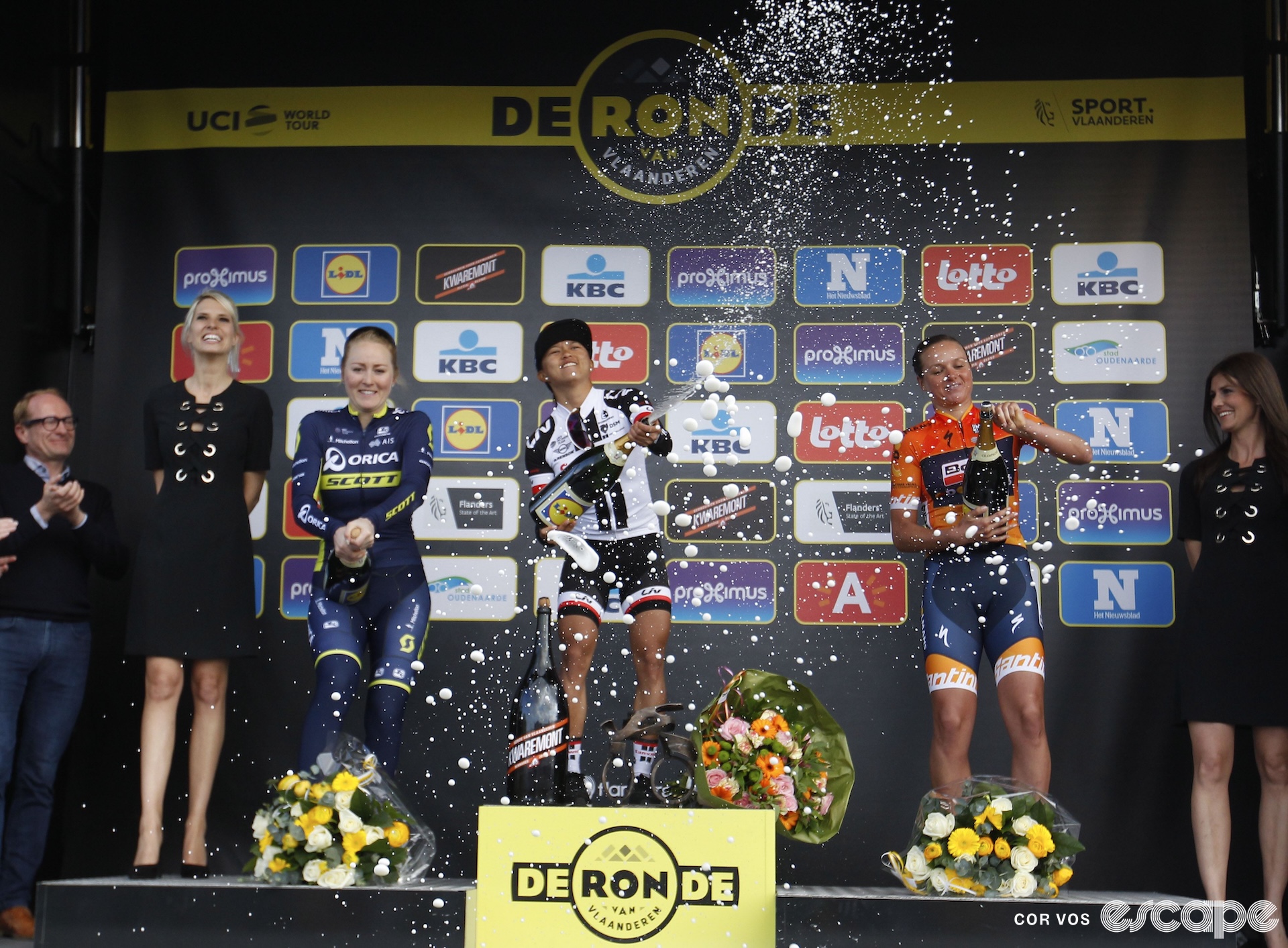
Growing up, that's how I fell in love with cycling. Watching the Tour de France reruns late night on TV from start to finish. If you can do that for the women, for now, it's like the last hour, and it just doesn't paint the complete picture of how you got to that point, how your teammates helped you get to that point. For the men, it's from before kilometers zero to the finish. So if you can do that, eventually get to that point, I think that is going to be huge for the sport.
AM: We've definitely made big strides, but there's still a lot that can be done to help the sport continue to progress. You also mentioned racing in the US, back in the day when it was it was kind of a golden age of racing, when we had all those great races in the US, like Philly Classic when most of the big European teams came over. We're seeing races drop away every year.
CL: And then you have an odd Maryland Classic that doesn't have a race because it's a little odd to throw it into the schedule. We're trying, but just for whatever reason we don't have the right environment or culture to get that back at the moment. Maybe we will be known for having the most grueling gravel races. Maybe that's what American cycling is meant to be, because our roads are just different. Our culture is different and that's okay too.
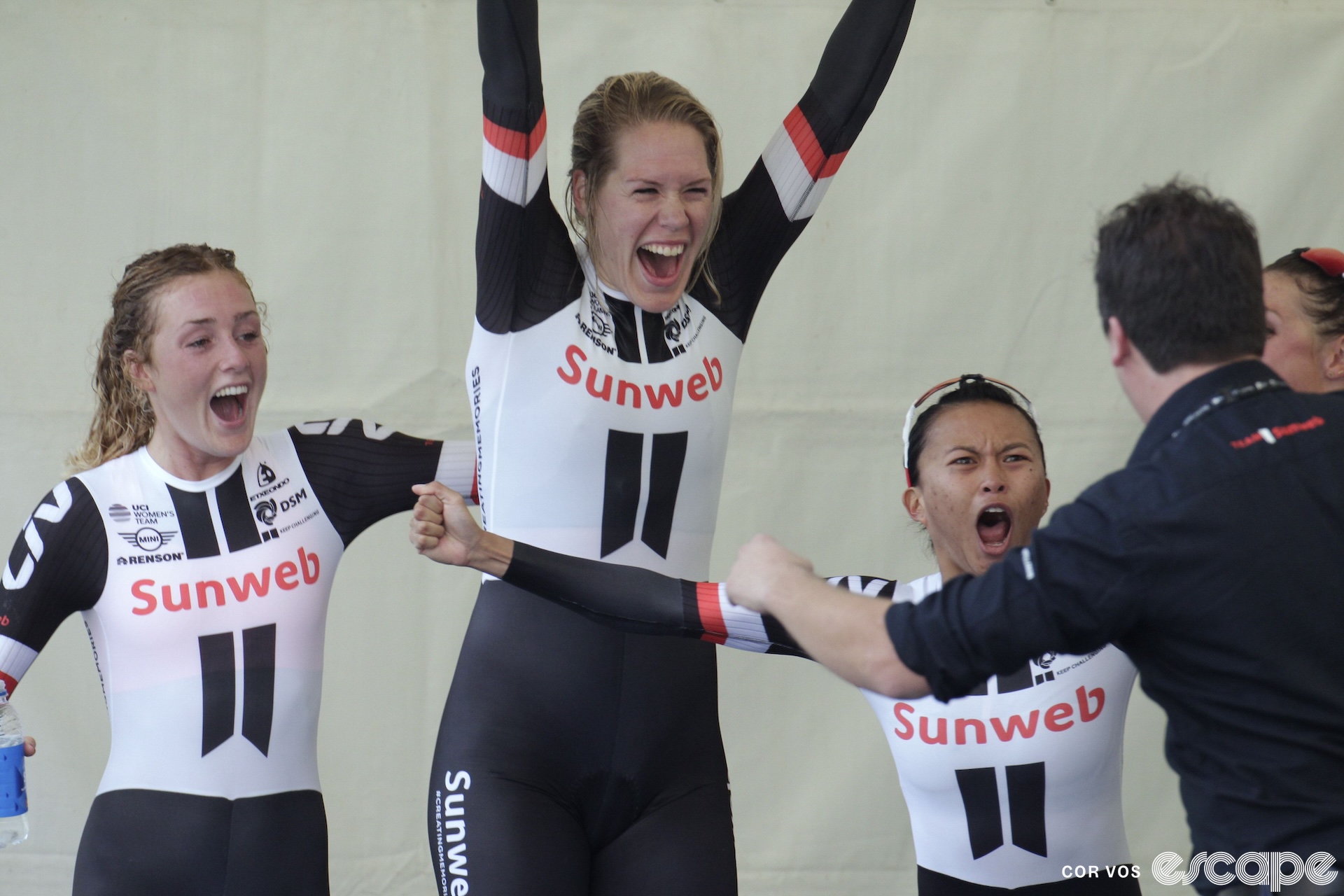
We don't have to be like Europe. There was that golden age where [Greg] LeMond and Lance [Armstrong] were making the sport so popular for Americans. That's when we had this big boom of cycling in America, and it was huge. So maybe it'll take our next great American to do that again for pure road cycling in America. For now, I think what we're doing with gravel is huge, and also crit racing. There's nothing like that in Europe, and you see some Euros coming over to race crits too. So it's just different.
AM: You mentioned watching the Tour de France growing up, which is how so many Americans get into cycling. Obviously, there was a Tour de France back in the day, but this new iteration of the race is something so much bigger than the sport itself, in a way. What was it like racing this new version of the Tour de France Femmes that's so similar to the men's in its reach beyond the sport of cycling?
CL: It's what we needed. For the men, you could say the Tour of France is the pinnacle of the sport, with the kind of reach that it has. We had La Course [by the Tour de France] previously, which I was also a part of, which was really cool, but what it is now is something super special.
I do love that it's not at the same time as the men, because [it attracts] our real fans. They aren't the people who are lined up to see the guys, waiting, and we're this afterthought. It's really important that we do have our own race and we have our own fans, and the attention is fully on us. I think that's really special and important for how that race has grown. Previously, with La Course, it was like on the [Champs-Elysses], it was before the men, and in some respects, felt like a little bit of an afterthought.
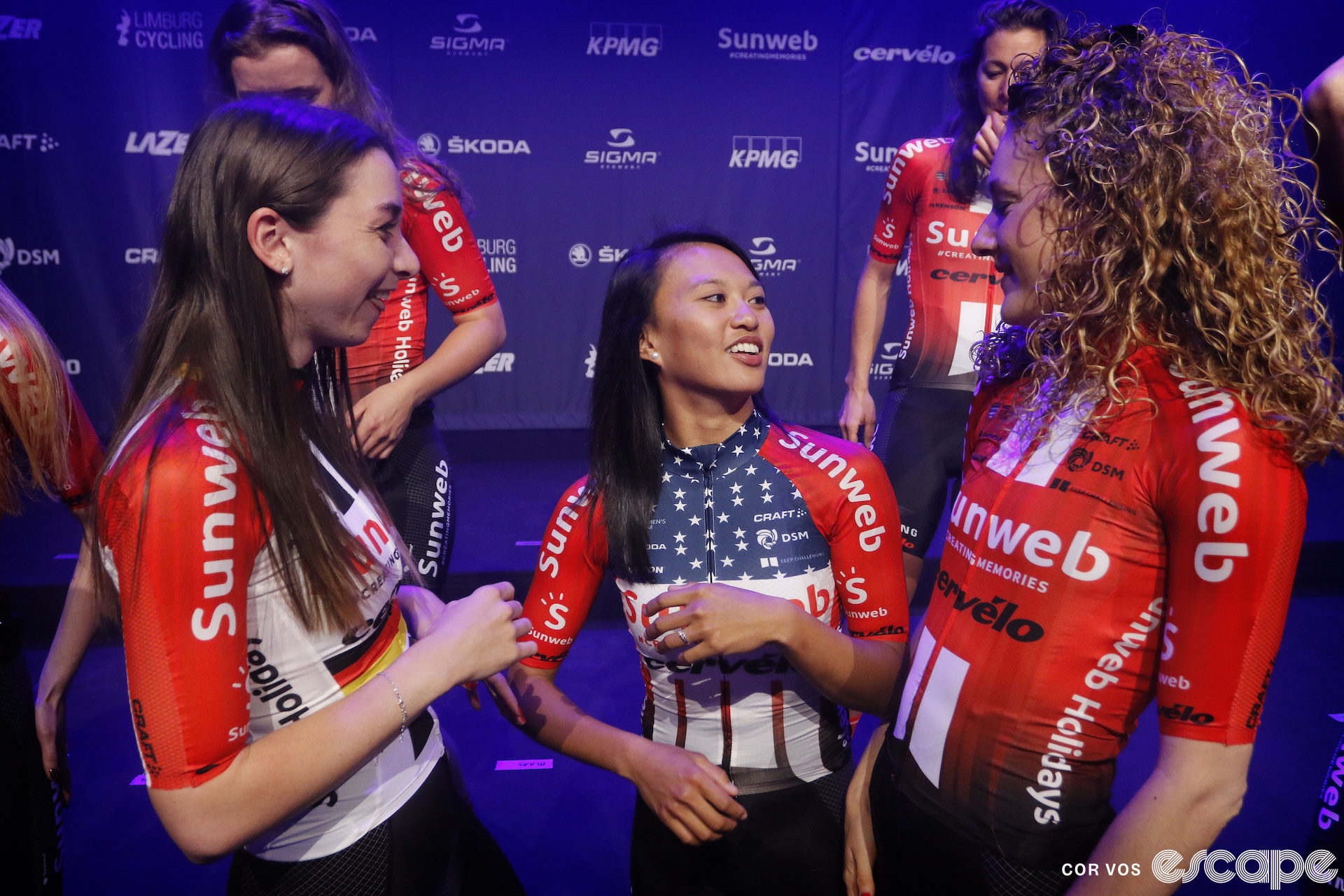
I'm really proud to be part of all those different steps to where it is now. Ten days in France, going from a to b, and changing every day. That's a real Tour de France. That is definitely where we want the sport to go, and you can clearly see, how exciting it is, and how people want to be there and watch it and watch on TV,
AM: When you're looking back on your career, if you take your victories out of the equation, what are some of your favorite memories of the sport?
CL: Mainly my favorite memories and something that I'll miss the most is being roommates with teammates, and the amount of time you spend with them in the room. You have to get to know each other or talk shit about whatever happened in the day or vent or cry or laugh or whatever, I think I'm definitely gonna miss that the most. A lot of my favorite moments in cycling. Also, throughout a stage race, as everybody just gets more and more tired it's just hilarious. That's something that you can't experience anywhere else in life. The stupidest thing will make you laugh just because you're absolutely exhausted, and that's a feeling and moment that I think is one of my favorites in in non-racing aspects.
AM: Spending so much time with teammates is something that is irreplaceable when you walk away from the sport.
CL: I've made lifelong friends in cycling, and that's something that I'll never forget.
AM: How was your final year racing with the EF-Oatly-Cannondale because you spent so much time on Dutch teams and coming back to an American team after so many years must have been a pretty cool experience.
CL: It was super nice, almost felt like home. And I was like, 'Oh man, why aren't you guys around earlier?'
It was the right place to be for me, and I was really happy to be part of that first year of that program and help set the foundation for that team. It's great when you can sit at a table with the guys and the girls from everywhere, but also especially when you're around North Americans to just talk about normal stuff when you're in Spain, you know. I feel like the level of English goes back to normal.
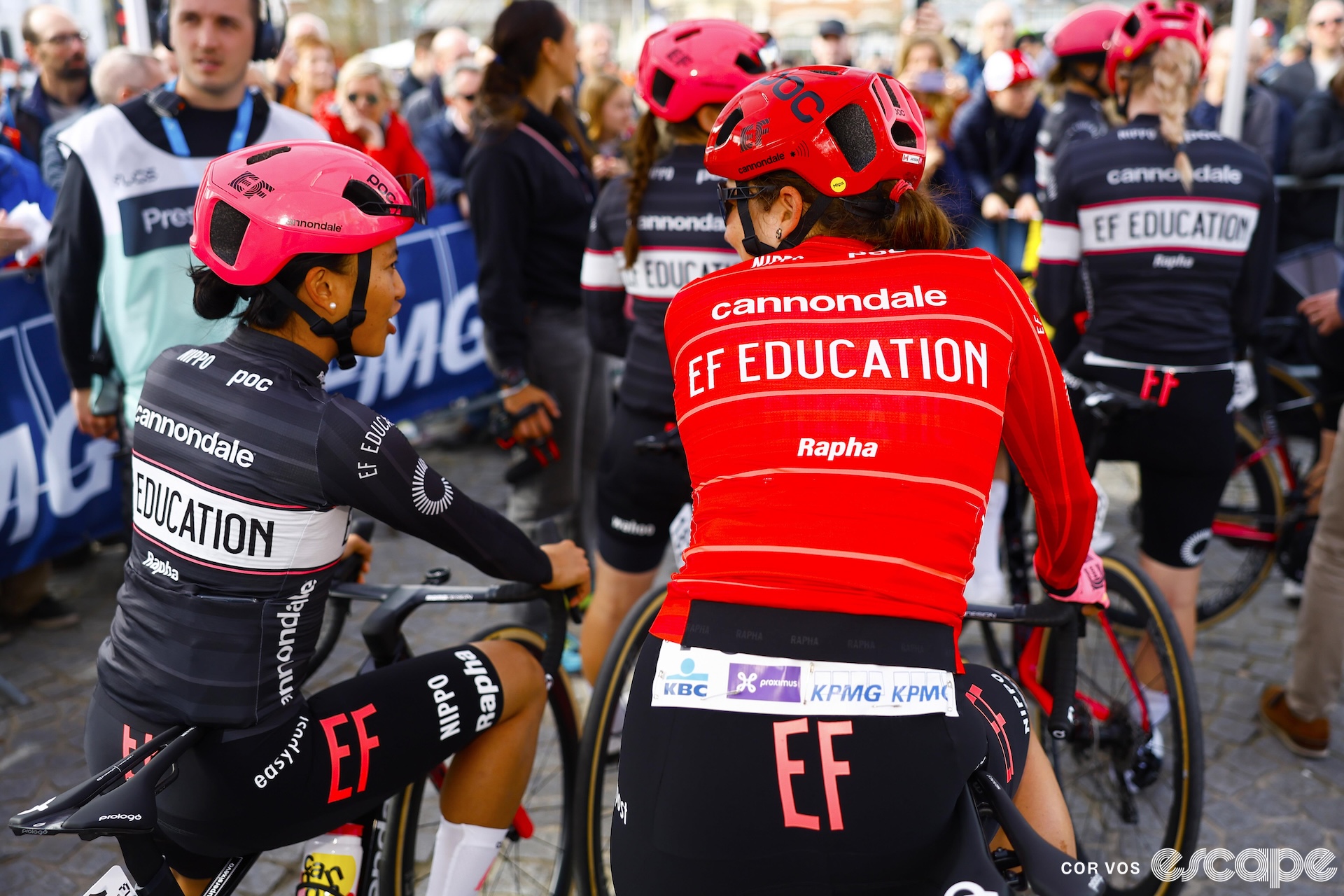
Spending 2-4 months in Europe, and you come back to the States and Nate's looking at me, like, what did you just say? Your English gets broken down. You've got to build it back up again so you don't sound like an idiot when you come back home. But it's nice when you can talk to other North Americans and use bigger words and put them together nicely and just little things like that, little comforts of home you could definitely feel within the team.
It was also a very, very international team, from everywhere. So it was really cool for the main structure of the team to be American of sorts. It definitely gave a different feeling to the team.
AM: A good place to kind of tie everything up.
CL: Absolutely. I wouldn't have wanted to tie it up in a different place.
AM: If you need any ideas for your future career, I've got a couple ideas for you. You could do the Dan Holloway live streaming during a crit, because you definitely know how to just hang out in the bunch. I bet having you on his podcast would be pretty sick, with all your expertise, but you could also be a pretty insane mentor to some of the younger riders in the peloton.
CL: I had been asked to do that as well, either to commentate or Holloway asked me to commentate on the bike, but I really don't foresee myself on the bike racing anymore. Because of how I'm wired. I won't be okay with just sitting in. I just really won't be okay with that.
AM: That competitive edge will kick in.
CL: Yeah, it's just a natural thing of mine, so I need to put that to rest and leave that to who wants to do it now. Maybe a little bit of commentating and I still help recruit for Marian University, so that's something that I really like to do to help the juniors find a pathway. Another option other than going directly professional. We'll see. I'm not too, too pressed on it, but maybe a little break will be nice from the cycling world and then get back in the fold when I'm ready.
Did we do a good job with this story?

